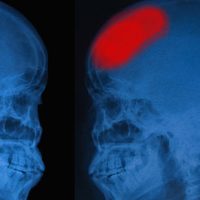Car Accident-Related Blunt Force Head Trauma

Of the many types of injuries that car crash victims can sustain, blunt force trauma to the head is among the most devastating. In fact, blunt force trauma, specifically to the head, is the leading cause of death for vehicle occupants.
What is Blunt Force Head Trauma?
Blunt force head trauma occurs when the head sustains a sudden impact, usually from a hard surface or object (like the steering wheel, side window, or dashboard), that doesn’t penetrate the skull. While blunt force trauma can happen as a result of a fall, a sport injury, an assault, or a workplace accident, most involve vehicle collisions. In the latter case, the severity of this trauma will depend on a number of factors, including:
- The mass of the object that strikes the victim’s head;
- The speed at which the object was moving;
- The speed at which the vehicle was traveling; and
- The angle of the impact.
Because these factors will vary greatly depending on the specifics of the car crash in question, no two blunt force trauma injuries will be exactly the same, as even a minor variation in the angle of impact can affect the seriousness of the injury.
The Effects of Blunt Force Head Trauma
Any sudden and forceful impact to the head can cause immediate symptoms, including:
- Confusion;
- Loss of consciousness;
- Convulsions;
- Blurred vision; and
- Vomiting.
Unfortunately, not all head trauma-related symptoms manifest immediately. For instance, severe headaches, personality changes, insomnia, and even partial paralysis can occur hours or even days after a serious head injury. This is why it’s so important for car accident victims who sustain any sort of blow to the head, to seek medical attention right away. A trained specialist will be able to recognize the signs of a brain bleed or other internal head injury that may not present itself immediately and in so doing, can begin treatment as soon as possible.
Recovery from Blunt Force Head Trauma
How long it takes an accident victim to recover from a blunt force head trauma depends on the severity of the injury and the age and health of the victim. Some, for instance, who suffer only minor injuries may be able to move on with their lives after only a few weeks of healing and treatment. Sadly, this is not always the case for those who sustain more significant injuries, many of whom are never able to fully return to their pre-accident state of health. In either situation, injured parties whose accidents were the result of negligence can and should seek compensation for their medical bills, lost wages, and pain and suffering from the at-fault party responsible for the crash.
Seeking Financial Compensation for Your Head Injury
Call 954-566-9919 to speak with an experienced Florida car accident lawyer who can get to the bottom of the cause of your collision and subsequent injury. The sooner you connect with a legal representative, the better your chances of obtaining a fair settlement. Call Boone & Davis or send us an online message to get started.
Sources:
ncbi.nlm.nih.gov/pmc/articles/PMC9636288/
ninds.nih.gov/health-information/disorders/traumatic-brain-injury-tbi
